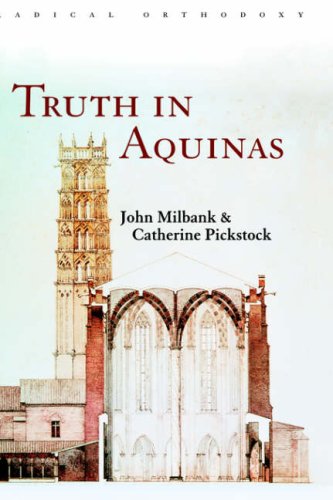Product desciption
Truth In Aquinas Routledge Radical Orthodoxy 1st Edition John Milbank by John Milbank, Catherine Pickstock 9780415233347, 9780415233354, 0415233348, 0415233356 instant download after payment.
Milbank and Pickstock (hereafter MP) attempt a postmodern (not in a perjorative sense) rereading of Aquinas that ironically gets back to the source of Aquinas. MP notes that many folks, protestants and Catholics alike, have read correspondence theories of truth back into Aquinas (cf Peter Kreeft's otherwise excellent *Summa of the Summa*). This misses what truth is for Aquinas. Truth is not only epistemological, but ontological. It has a proportion between the other transcendentals. MP illustrates "Truth" in chapters concerning Vision, Touch, and Language. I will focus primarily on Truth and Touch. MP spends the entire chapter using Aristotle's *De Anima* as a foil. Common sense will tell us that a sense like "Sight" is much superior to "touch," but in a brilliant summary MP convinces us that this is not so. Touch, unlike sight or sound, is not mediated. Sight and Sound are mediated by light and air. Touch is immediate. (Actually, it is not but they take up that point on a chapter devoted to the Eucharist.). Space fails but they demonstrate how "touch", Incarnation, and Aesthetics interrelate. Their Eucharistic theology foils both what they call Calvinism (which is actually Zwinglianism and U.S. Southern Presbyterianism). Traditional Catholicism, in Derridean terms, is a theology of "presence." E.g., the element is there. Christ is presence. Thus, postmodernism is dead. But maybe not. Protestantism (or what they call it) is a theology of "abscence." Christ isn't there in the elements. Thus, we see parts of a postmodernism. MP then shows how it is both. Other neat points of controversy: According to MP's reading of Thomas, philosophy and theology aren't separated. They are different in degree,not in kind. This puts Thomas on the same floor with Van Til who said philosophy and theology are the same thing, just using a different vocabulary. Concerns: If you are new to philosophy, theology, or church history, don't read this book. It is arguably the hardest book I have ever read. I know 3 or 4 languages and I needed several lingual dictionaries to keep up. But if you are interested in Thomism, the Eucharist, or philosophical theology, then this book is for you.


